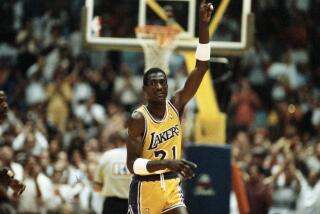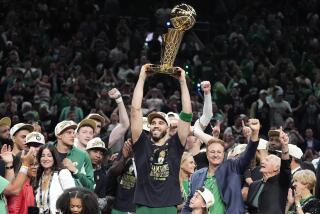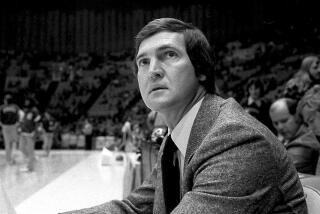NBA PLAYOFFS : The Best of the Playoffs in the 1980s
- Share via
It was a decade of Lakers magic and the Lakers’ Magic.
On the eve of the last championship series of the 1980s, the Lakers already are assured of being remembered as the team of the decade.
After years of intense rivalry with Larry Bird, Magic Johnson is a cinch to be recalled as the star of the decade, at least when it came time to win NBA titles.
Five times in the 1980s, the Lakers earned championship rings, and last year they managed to end a 19-year run of failure by defending champions.
Johnson keyed the championship drives, winning three playoff Most Valuable Player awards.
“No one deserves the accolades more,” said Pat Riley, coach of four Lakers championship teams. “Magic is the NBA Finals.”
Teammates James Worthy and Kareem Abdul-Jabbar, who earned one MVP each, join Johnson, Bird and Andrew Toney of Philadelphia on a statistical-based All-Star team for the NBA Finals.
Johnson has averaged 19.3 points, 8.2 rebounds and 11.9 assists and shot 52.7 percent from the field in 42 championship series games.
In the decade’s first Finals, Johnson produced an enduring image for his career -- that he could do anything it takes to win.
“My best memory of the Finals was in Philly, playing center in Game 6 my first year and winning the NBA title,” he said.
In that game, Magic took over for an injured Abdul-Jabbar at center and had 42 points, 15 rebounds and seven assists. The Lakers won the title with a 123-107 victory over the 76ers and assured Johnson the first of his three playoff MVP awards.
Worthy also has raised his game in the Finals, averaging 22.1 points in 26 games and winning the MVP last year when he scored 114 points in the Lakers’ four victories over Detroit.
“James has proved himself as a big-game player his whole career,” Riley said. “It’s a worn-out phrase to say that he picks up his game when it matters the most, but he does. He focuses more when it really counts. All the great ones do.”
Abdul-Jabbar, while overshadowed by Johnson for most of the decade, matches his five championship rings. Kareem’s most proud of his MVP performance in 1985, when the Lakers reversed years of frustration by finally besting the Celtics.
“We’ve always looked to Kareem for the big shots, especially in the Finals,” Riley said.
In 41 games in the Finals, Abdul-Jabbar averaged 22.7 points and 8.0 rebounds.
“James and Kareem are great winners,” Johnson said. “They’ve always delivered when it mattered. Each of them truly knows what it takes to win.”
Bird averaged 23.1 points, 11.6 rebounds and 6.0 assists in 31 Finals games for the Celtics and he won MVP awards in 1984 and 1986, Boston’s 15th and 16th championship years.
Toney, who appeared in 10 championship series games for the 76ers in 1982 and 1983, was the leading Finals scorer of the decade, averaging 24.4 points. He also had 7.0 assists per game, a high number for a shooting guard.
A second unit for the Finals All-Star team for the decade, would include Moses Malone of Philadelphia and Houston, Dennis Johnson and Kevin McHale of Boston and Julius Erving and Maurice Cheeks of Philadelphia.
Malone has impressive enough statistics to be considered for first team, but Abdul-Jabbar got the nod with five titles to one for Malone, when he was with the 76ers in 1983.
Malone, who played 10 games in two championship series, averaged 23.7 points and 16.6 rebounds.
Dennis Johnson, who played on two of Boston’s three championship teams in the 1980s, averaged 18.4 points and 7.1 assists in 25 games.
McHale averaged 17.9 points and 7.4 rebounds in 31 games and made 54.4 percent of his field-goal attempts.
Erving and Cheeks played in 16 games apiece in 1980, 1982 and 1983. Erving averaged 23.7 points and 7.8 rebounds and Cheeks 14.8 points and 7.3 assists.
More to Read
All things Lakers, all the time.
Get all the Lakers news you need in Dan Woike's weekly newsletter.
You may occasionally receive promotional content from the Los Angeles Times.







